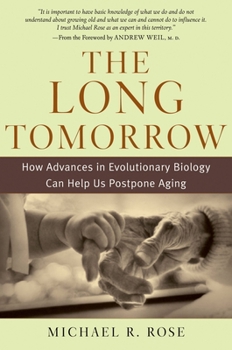The Long Tomorrow: How Advances in Evolutionary Biology Can Help Us Postpone Aging
Select Format
Select Condition 
Book Overview
The conquest of aging is now within our grasp. It hasn't arrived yet, writes Michael R. Rose, but a scientific juggernaut has started rolling and is picking up speed. A long tomorrow is coming.
In The Long Tomorrow, Rose offers us a delightfully written account of the modern science of aging, spiced with intriguing stories of his own career and leavened with the author's engaging sense of humor and rare ability to make contemporary research understandable to nonscientists. The book ranges from Rose's first experiments while a graduate student--counting a million fruit fly eggs, which took 3,000 hours over the course of a year--to some of his key scientific discoveries. We see how some of his earliest experiments helped demonstrate that "the force of natural selection" was key to understanding the aging process--a major breakthrough. Rose describes how he created the well-known Methuselah Flies, fruit flies that live far longer than average. Equally important, Rose surveys the entire field, offering colorful portraits of many leading scientists and shedding light on research findings from around the world. We learn that rodents given fifteen to forty percent fewer calories live about that much longer, and that volunteers in Biosphere II, who lived on reduced caloric intake for two years, all had improved vital signs. Perhaps most interesting, we discover that aging hits a plateau and stops.
Popular accounts of Rose's work have appeared in The New Yorker, Time magazine, and Scientific American, but The Long Tomorrow is the first full account of this exciting new science written for the general reader.
"Among his peers, Rose is considered a brilliantly innovative scientist, who has almost single-handedly brought the evolutionary theory of aging from an abstract notion to one of the most exciting topics in science."--Malcolm Gladwell, The New Yorker
In The Long Tomorrow, Rose offers us a delightfully written account of the modern science of aging, spiced with intriguing stories of his own career and leavened with the author's engaging sense of humor and rare ability to make contemporary research understandable to nonscientists. The book ranges from Rose's first experiments while a graduate student--counting a million fruit fly eggs, which took 3,000 hours over the course of a year--to some of his key scientific discoveries. We see how some of his earliest experiments helped demonstrate that "the force of natural selection" was key to understanding the aging process--a major breakthrough. Rose describes how he created the well-known Methuselah Flies, fruit flies that live far longer than average. Equally important, Rose surveys the entire field, offering colorful portraits of many leading scientists and shedding light on research findings from around the world. We learn that rodents given fifteen to forty percent fewer calories live about that much longer, and that volunteers in Biosphere II, who lived on reduced caloric intake for two years, all had improved vital signs. Perhaps most interesting, we discover that aging hits a plateau and stops.
Popular accounts of Rose's work have appeared in The New Yorker, Time magazine, and Scientific American, but The Long Tomorrow is the first full account of this exciting new science written for the general reader.
"Among his peers, Rose is considered a brilliantly innovative scientist, who has almost single-handedly brought the evolutionary theory of aging from an abstract notion to one of the most exciting topics in science."--Malcolm Gladwell, The New Yorker
Format:Hardcover
Language:English
ISBN:0195179390
ISBN13:9780195179392
Release Date:September 2005
Publisher:Oxford University Press
Length:192 Pages
Weight:0.93 lbs.
Dimensions:0.8" x 6.6" x 9.4"
Customer Reviews
2 ratings
Good book to read, great with evolution
Published by Thriftbooks.com User , 19 years ago
This book was amazing and awesome. You will learn a lot about aging from fruit flies. When I finished this book, I was surprised that a new author's first book was really good. I think biologist and scientist will enjoy this book.
Summary of What Causes us to Grow Old
Published by Thriftbooks.com User , 19 years ago
Evolutionary biology attempts to explain how we age by looking at genes within our DNA that either allow or force our bodies to age. Unfortunately in nature's desire to populate the planet, it doesn't select for these genes as dominate. Nature makes us want to have offspring young. Just look at the teenage pregnancy rate. Artificially we have learned that selective breeding in race horses, show dogs, prize winning cattle, and other animals have produced new animals with desirable traits. Dr. Rose's research used fruit flies to produce new generations that lived longer. Could similar selective breeding in humans produced a longer lived race. Probably, but it would take centuries. Can we extend longevity through diet, drugs and medicine - yes, we already have, and are continuing to do so. Combining all of this, Dr. Rose has written a book that summarized the current state of knowlege in the field. The science fiction readers of Robert Heinlein's Lazarus Long books reflect a similar story, the hero is the result of centuries of such breeding.





